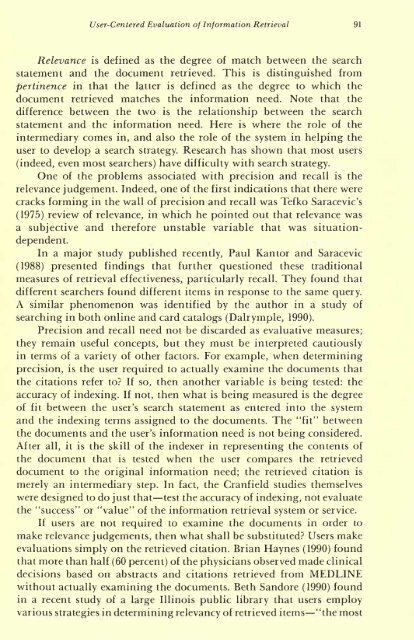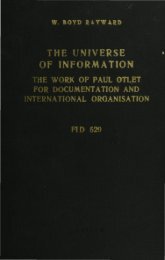User-Centered Evaluation of Information Retrieval - ideals
User-Centered Evaluation of Information Retrieval - ideals
User-Centered Evaluation of Information Retrieval - ideals
Create successful ePaper yourself
Turn your PDF publications into a flip-book with our unique Google optimized e-Paper software.
<strong>User</strong>-<strong>Centered</strong> <strong>Evaluation</strong> <strong>of</strong> <strong>Information</strong> <strong>Retrieval</strong> 91<br />
Relevance is defined as the degree <strong>of</strong> match between the search<br />
statement and the document retrieved. This is distinguished from<br />
pertinence in that the latter is defined as the degree to which the<br />
document retrieved matches the information need. Note that the<br />
difference between the two is the relationship between the search<br />
statement and the information need. Here is where the role <strong>of</strong> the<br />
intermediary comes in, and also the role <strong>of</strong> the system in helping the<br />
Research has shown that most users<br />
user to develop a search strategy.<br />
(indeed, even most searchers) have difficulty with search strategy.<br />
One <strong>of</strong> the problems associated with precision and recall is the<br />
relevance judgement. Indeed, one <strong>of</strong> the first indications that there were<br />
cracks forming in the wall <strong>of</strong> precision and recall was Tefko Saracevic's<br />
(1975) review <strong>of</strong> relevance, in which he pointed out that relevance was<br />
a subjective and therefore unstable variable that was situationdependent.<br />
In a major study published recently, Paul Kan tor and Saracevic<br />
(1988) presented findings that further questioned these traditional<br />
measures <strong>of</strong> retrieval effectiveness, particularly recall. They found that<br />
different searchers found different items in response to the same query.<br />
A similar phenomenon was identified by the author in a study <strong>of</strong><br />
searching in both online and card catalogs (Dalrymple, 1990).<br />
Precision and recall need not be discarded as evaluative measures;<br />
they remain useful concepts, but they must be interpreted cautiously<br />
in terms <strong>of</strong> a variety <strong>of</strong> other factors. For example, when determining<br />
precision, is the user required to actually examine the documents that<br />
the citations refer to? If so, then another variable is being tested: the<br />
accuracy <strong>of</strong> indexing. If not, then what is being measured is the degree<br />
<strong>of</strong> fit between the user's search statement as entered into the system<br />
and the indexing terms assigned to the documents. The "fit" between<br />
the documents and the user's information need is not being considered.<br />
After all, it is the skill <strong>of</strong> the indexer in representing the contents <strong>of</strong><br />
the document that is tested when the user compares the retrieved<br />
document to the original information need; the retrieved citation is<br />
merely an intermediary step. In fact, the Cranfield studies themselves<br />
were designed to do just that test the accuracy <strong>of</strong> indexing, not evaluate<br />
the "success" or "value" <strong>of</strong> the information retrieval system or service.<br />
If users are not required to examine the documents in order to<br />
make relevance judgements, then what shall be substituted? <strong>User</strong>s make<br />
evaluations simply on the retrieved citation. Brian Haynes (1990) found<br />
that more than half (60 percent) <strong>of</strong> the physicians observed made clinical<br />
decisions based on abstracts and citations retrieved from MEDLINE<br />
without actually examining the documents. Beth Sandore (1990) found<br />
in a recent study <strong>of</strong> a large Illinois public library that users employ<br />
various strategies in determining relevancy <strong>of</strong> retrieved items "the most
















